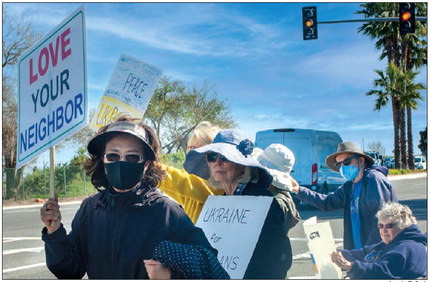United Nations said more than ….


United Nations said more than 2.8 million people have now fled Ukraine. More than 1.5 million refugees crossed into Poland, but about 40 percent of them are thought to have subsequently left for other countries.
With Leisure World residents still reeling from pandemic- related repercussions, the war has spurred many to action.
“It’s breaking my heart,” said Thuy Do, a Vietnam refugee who lives in Mutual 14. She is an artist who channeled her talent to create a fused glass tribute to the people of Ukraine.
Her yellow-and-blue plate features a dove in the center, expressing her deepest wish for the people of Ukraine, “that they may have truly long-lasting peace. She was moved to create the plate by a photo showing a group of boys huddled together, each holding a rosary to pray, and each with an expression of fear on his face.
“It (caused) me to realize what was happening in the Ukraine, and it deeply saddened me,” she said. “Children deserve to live in happiness and love. Those poor little boys are enduring so much fear and anxiety caused by the war.”
During her youth, she experienced the devastation of living in a war-torn country. “Constant fear is a part of such violence, and I still bear the emotional wounds that it caused,” she said.
Whether it is through art or protests, LWers are showing their support of the Ukrainians. There are many ways to help, with numerous nonprofits stepping up to provide medical supplies, food, cash assistance and other essentials for those fighting in Ukraine and those fleeing to neighboring countries.
Here is a list of nonprofits working around the world to support Ukraine, according to NonProfit Pro, a newsletter for thought leaders and innovators in the nonprofit world. Some of these websites provide continual updates on the war’s impacts and other compelling information that goes deeper than the day’s headlines. They also provide links for donations and other support.
• CARE: https://www.care.org CARE is raising money via its Ukraine Crisis Fund to reach 4 million Ukrainians— prioritizing women and girls, families, and the elderly—with immediate aid, including food, water, hygiene kits, psychosocial support and cash assistance. Its teaming up with People in Need to coordinate efforts. The first trucks with supplies of food, hygiene items, diapers, sleeping bags and mats departed March 1.
“The population in eastern Ukraine has been suffering from the conflict for almost eight years now,” Sofía Sprechmann Sineiro, CARE’s International Secretary General, said in a statement. “Every day is a fight for survival. Besides fear of attacks and violence, millions of people have no access to essential resources and services. The COVID-19 pandemic further exacerbates the situation.”
• Direct Relief: https://www. directrelief.org
Over the past six months, Direct Relief has supplied $26 million in aid to Ukraine. Since the conflict began, Direct Relief has worked directly with the country’s Ministry of Health to provide 360 emergency medical backpacks for first responders and $500,000 in medical support to Ukraine and surrounding countries that are receiving refugees.
“Right now, the types of items being urgently requested indicate they are dealing with severe, acute injuries,” Alycia Clark, Direct Relief’s director of pharmacy and clinical affairs, said in a statement. “The medications and supplies are typically utilized in a critical care setting.”
• International Committee of the Red Cross: https://www. icrc.org
Ukraine is among the top 10 largest operations for the International Committee of the Red Cross, with more than 600 staffers working with the Ukrainian Red Cross. The nonprofit provides refugees emergency assistance, such as food, water and other essential items, and healthcare facilities with medical equipment and emergency preparedness. In addition, it repairs water stations, supports households to rehabilitate their damaged homes and reconnects families separated by the conflict.
On its website, it details current challenges: “Given the hostilities, we are not able to move needed supplies because of blocked roads and insecurity. This is an extremely dangerous time for families caught in the fighting, and a dangerous time for aid organizations, too. As soon as we do move aid in, the top priorities will be medical supplies and shelter material (tarpaulin, blankets).”
• International Rescue Committee: https://www.rescue. org
With a history of responding to humanitarian crises, the International Rescue Committee is on the ground in Ukraine and Poland supporting those fleeing the war. It has teamed up with the Disasters Emergency Committee and launched an emergency response for Ukraine. Uber also announced it is matching donations through its app for the International Rescue Committee, up to $1 million.
• Doctors Without Borders: https://www.doctorswithoutborders. org
In Mariupol, Ukraine, teams from Médecins Sans Frontieres (Doctors Without Borders) have distributed medical kits and provided telemedicine trauma care training for 30 surgeons from eastern Ukraine. The group is shipping truckloads of surgical kits, trauma kits, chronic disease medications and mass casualty supplies from Brussels. Many hospitals have limited staff and supplies, and those shortages have been exacerbated due to an influx of wounded patients. Therefore, Médecins Sans Frontieres is rushing new shipments of emergency medical supplies—including its few remaining medical stocks for emergency surgery and trauma care—for facilities in areas where there is active fighting. Additionally, the organization will send more experienced medical staff and provide trauma care training to staff in the country via telemedicine.
The nonprofit will continue to assess the country’s needs and the feasibility to reach additional cities, such as Odessa, Mykolaiv or Kherson. The nonprofit also has teams in Poland, Moldova, Romania, Russia and Belarus to assess medical humanitarian needs for those crossing the border.
It is currently ramping up efforts in Poland, where it donated items to a reception shelter and assisted refugees suffering from exhaustion, dehydration or hypothermia after their long journeys to cross the border.
• Project HOPE: https:// www.projecthope.org
Project HOPE has tapped into its social followings to raise more than $237,000 from hundreds of social media fund raisers on platforms such as Twitter and Discord. The nonprofit began tackling health challenges in Ukraine in 2002 and reports that pharmacies and stores in Kyiv are empty, and hospitals and health facilities have serious shortages of medical supplies. The organization has been sourcing and shipping essential medicines and medical supplies, including hygiene kits, interagency emergency health kits and insulin.
Its teams on the ground are assessing medical facilities in and near Dnepro, Ukraine, as well as determining the needs at the border and readying pharmaceuticals, medicines and medical supplies in Krakow, Poland; Bucharest, Romania; and Chisinau, Moldova.
Tom Cotter, Project HOPE’s director of emergency response, reports from the Romanian border that Ukrainian refugees are pouring into the country via ferry and vehicle as well as on foot.
• Save the Children: https:// www.savethechildren.org
Save the Children estimates at least 400,000 children are fleeing Ukraine with nothing more than the clothes on their backs and at risk of hunger, illness, trafficking and abuse.
The organization’s Ukraine Crisis Relief Fund will provide lifesaving assistance to children and families, like a woman who stayed at a temporary camp with her 4-year-old daughter and 2-year-old son before moving to a reception center where Save the Children runs child-friendly spaces.
She told the organization she fled Ukraine with her children in hopes of reaching the Czech Republic, where her friends live.
“On the way, we saw planes overhead, and the roads were very busy,” she told the nonprofit.
“We saw rockets being fired and destroying buildings. Sirens were constantly blaring. My husband stayed behind. He drove us to the border before going back. We could only bring a few clothes and some medicines.”
• UNICEF: https:// www. unicefusa.org
UNICEF is helping children in Ukraine, as well as surrounding countries. Services include health care, psychosocial support, protection, education, water and sanitation, as well as the establishment of 26 “Blue Dot” safe spaces along transit routes that can each provide services to 3,000-5,000 people per day. The nonprofit estimates the majority of refugees from Ukraine are children.
Sophia, 19, fled her home in Chernivtsi, Ukraine, with her sister, Tania, and her niece —Tania’s daughter—Mia, 2. They crossed the border into Romania on Feb. 27 and were headed to Spain to stay with an uncle until it’s safe to return.
“It was a decision [to leave] taken in just a few moments because the situation in Ukraine is very hard, and you don’t know what will be in the next minute. Nobody feels safe now in Ukraine,” the 19-year-old told the nonprofit.
• USA for the UN Refugee Agency: https://www.unrefugees. org
The USA for the UN Refugee Agency predicts 4 million people will be forced to leave the Ukraine if the conflict continues. The organization is distributing emergency supply kits with necessary items, such as thermal blankets and water cans, and setting up transit centers in neighboring countries to assess the needs of refugees.
Blake Lively and Ryan Reynolds announced a matching gift for the organization on Feb. 26. “Our heartfelt thanks and gratitude to Ryan Reynolds and Blake Lively for pledging $1 million in support of families from Ukraine who have been forced to flee for their lives,” Anne-Marie Grey, executive director and CEO of the USA for the UN Refugee Agency, said in a statement. “In less than 48 hours, their compassion inspired thousands of Americans to donate and show newly displaced families that they are not alone.”
• World Central Kitchen:
https://wck.org
World Central Kitchen has been serving hot meals to refugees at a 24-hour pedestrian border crossing in southern Poland since Feb. 24. It has since increased its efforts by adding services at eight accommodation centers in multiple countries, including Poland, Romania and Moldova. Meals include a traditional Polish soup called Żurek that is made with white sausage, smoked meat and sour fermented rye flour. The organization has served tens of thousands of meals in coordination with 26 restaurants in Poland. Additionally, the nonprofit partnered with Ukrainian restaurants to serve hot meals to those in need in foure Ukrainian cities, including Kharkiv, Kherson, Kyiv and Lviv. Despite active fighting, World Central Kitchen continues to serve there.
—from staff reports
Motorists on Seal Beach Boulevard honked in support of the Senior Peace Club's latest show of support for the Ukraine last week.
Laurie Bullock




